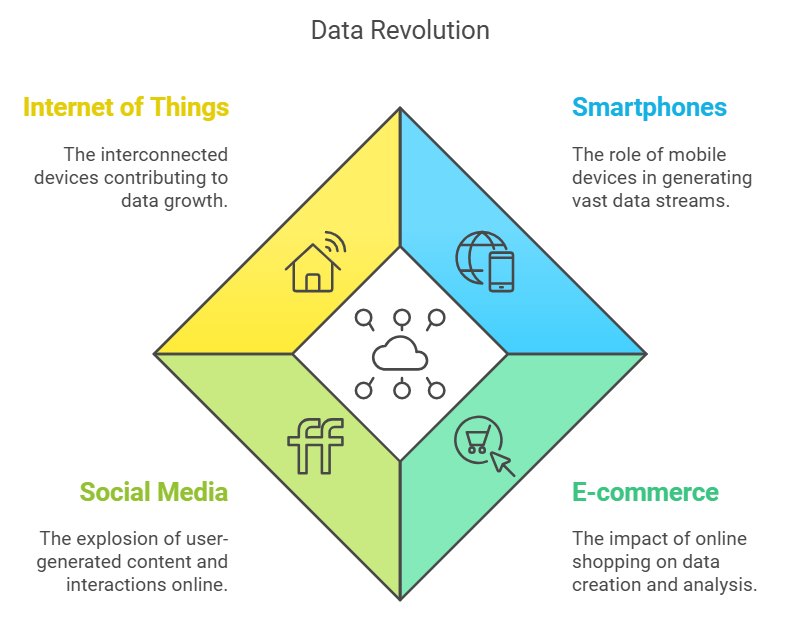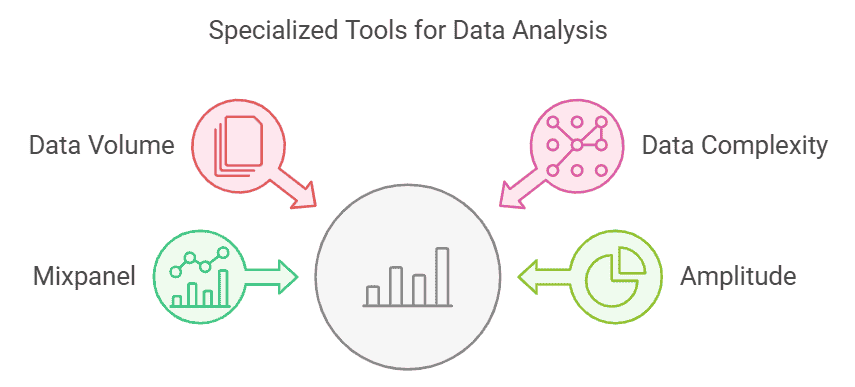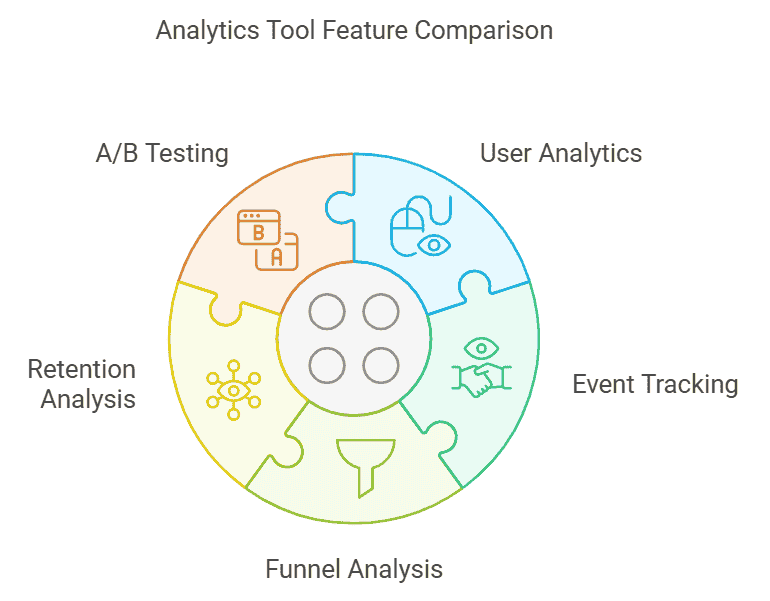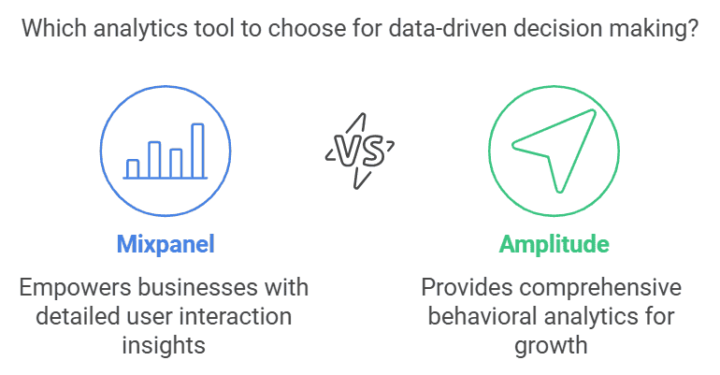In the digital landscape of the 21st century, data is not just king; it’s the entire kingdom.
Whether it’s a budding startup or a major tech corporation, all thriving businesses realize that data serves as the lifeblood of contemporary commerce.
In this data-driven age, two powerful tools have emerged as essential compasses for organizations seeking to navigate this ever-expanding kingdom: Mixpanel vs Amplitude.
Analytics tools such as Mixpanel and Amplitude play a crucial role, empowering businesses in an era where every click, tap, and interaction generates an ocean of data.
These tools offer a bridge to connect the dots, a window to see trends and a guide to making informed decisions that transform a business from a mere contender to a market leader.
The digital world is like vast, uncharted territory, and businesses that harness the power of analytics with the right tool can navigate this wilderness with confidence.
Deciding whether to use Mixpanel or Amplitude is akin to an explorer choosing the perfect compass for navigating a landscape rich with opportunities for growth and achievement.
The Data Revolution and Business Survival

In recent years, we’ve witnessed an unprecedented revolution in how data is collected, processed, and utilized.
The proliferation of smartphones, the rise of e-commerce, the explosion of social media, and the Internet of Things (IoT) have led to an avalanche of data creation.
Every digital interaction generates data points.
Key Points:
- Survival hinges on data understanding.
- Relying on gut instincts is no longer sufficient.
- Data-driven decision-making is the cornerstone of business strategy.
The Need for Specialized Tools

The sheer volume and complexity of data make it impossible to analyze manually.
It is where specialized tools like Mixpanel and Amplitude enter the picture.
They provide businesses with the means to collect, process, and visualize data on a scale and depth that would only be achievable otherwise.
Applications Across Industries:
- Retail: Optimize online stores.
- Media: Understand reader engagement.
- Healthcare: Improve patient outcomes.
The Mixpanel vs Amplitude Dilemma
This article will evaluate and contrast two prominent analytics tools: Mixpanel vs Amplitude.
Choosing between these platforms can be challenging for businesses, shaping how they understand their users and drive growth.
Considerations for Choice:
- Unique features
- User experience
- Pricing structures
The Battle of Analytics Tools: A Deep Dive into Mixpanel vs Amplitude
A. Brief overview of Mixpanel and Amplitude
- Mixpanel: Focuses on user-centric analytics.
- Amplitude: Offers comprehensive product analytics features.
B. Importance of analytics tools in modern business
- Enable data-driven decisions and optimize user experiences.
Features and Capabilities

| Feature | Mixpanel | Amplitude |
|---|---|---|
| User Analytics | Tracks user behavior, engagement, demographics. | Provides user-level insights and segmentation. |
| Event Tracking | Custom event tracking for interactions. | Advanced event tracking features. |
| Funnel Analysis | Identifies drop-off points in user journeys. | Core feature for understanding user paths. |
| Retention Analysis | Understands user return rates over time. | Includes retention analysis. |
| A/B Testing | Supports experimentation with product versions. | Limited A/B testing options. |
Ease of Use
A. Mixpanel
- User Interface: User-friendly with customizable dashboards.
- Learning Curve: Moderate, eased by interface design.
- Customization Options: Tailored tracking events and reports.
B. Amplitude
- User Interface: Intuitive and visually appealing.
- Learning Curve: Gentle, with helpful onboarding.
- Customization Options: Extensive for reports and dashboards.
Pricing
| Aspect | Mixpanel | Amplitude |
|---|---|---|
| Pricing Tiers | Based on tracked users/events. | Based on data volume and features. |
| Free Trial Options | Limited free trial available. | Typically offers a free trial period. |
| Scalability | Suitable for startups and enterprises. | Scales with the user base and data volume. |
Integration and Compatibility
A. Mixpanel
- Third-party Integrations: Wide range available.
- Platform Compatibility: Compatible with web, mobile, IoT.
- Developer-friendly Features: Offers APIs and developer tools.
B. Amplitude
- Third-party Integrations: Impressive list, including data warehouses.
- Platform Compatibility: Supports web and mobile applications.
- Developer-friendly Features: APIs, SDKs, and resources provided.
Customer Support and Community
| Aspect | Mixpanel | Amplitude |
|---|---|---|
| Support Options | Email, chat, phone (higher-tier). | Email, chat, possible phone support. |
| Documentation | Comprehensive documentation and tutorials. | Knowledge base and webinars available. |
| User Community | Active community for insights and tips. | Community for user connection and resources. |
Use Cases and Industries
A. Mixpanel
- Typical Use Cases: Product optimization, engagement analysis.
- Industries Served: E-commerce, SaaS, mobile apps, gaming.
B. Amplitude
- Typical Use Cases: Product analytics, user behavior analysis.
- Industries Served: E-commerce, mobile apps, fintech, media.
Comparison
| Aspect | Mixpanel | Amplitude |
|---|---|---|
| Strengths | User-centric analytics, robust tracking. | Comprehensive product analytics, predictive. |
| Weaknesses | Learning curve for advanced features. | Can be overwhelming for beginners. |
Pros and Cons

| Tool | Strengths | Weaknesses |
|---|---|---|
| Mixpanel | User-centric, robust tracking, competitive pricing. | Learning curve, limited predictive analytics. |
| Amplitude | Comprehensive analytics, user-friendly interface. | Complex for beginners, higher pricing for larger organizations. |
Conclusion
In this extensive comparison, we’ve explored the features, ease of use, pricing, integration capabilities, customer support, use cases, and industries served by Mixpanel vs Amplitude.
Choosing the Right Tool:
- Mixpanel: Ideal for user-centric analytics and ease of use.
- Amplitude: Preferred for comprehensive product analytics and predictive capabilities.
The analytics landscape is continually evolving, and both Mixpanel and Amplitude play vital roles in helping businesses harness the power of data.
Whichever tool you choose, remember that the right analytics platform can significantly impact your success in the data-driven world.
Related Articles
- Discover integration-ready tools in our All-in-One Marketing Software Guide.
- Create meaningful surveys with Survey Software Tools.
- Optimize audience engagement via Email Marketing Tools.
Resources
Thanks for Reading!

